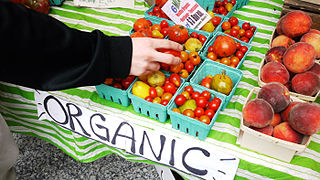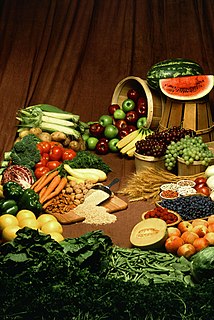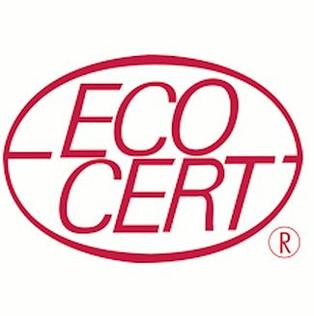Related Research Articles

Cosmetics comprise a range of products that are used to care for the face and body or to enhance or change the appearance of the face or body. The products include skin care, personal care, cosmetics and fragrance.
Health claims on food labels and in food marketing are claims by manufacturers of food products that their food will reduce the risk of developing a disease or condition. For example, it is claimed by the manufacturers of oat cereals that oat bran can reduce cholesterol, which will lower the chances of developing serious heart conditions. Vague health claims include that the food inside is "healthy", "organic", "low fat", "non-GMO", "no sugar added", or "natural".

The organic movement broadly refers to the organizations and individuals involved worldwide in the promotion of organic farming and other organic products. It started around the first half of the 20th century, when modern large-scale agricultural practices began to appear.

Organic certification is a certification process for producers of organic food and other organic agricultural products. In general, any business directly involved in food production can be certified, including seed suppliers, farmers, food processors, retailers and restaurants. A lesser known counterpart is certification for organic textiles that includes certification of textile products made from organically grown fibres.
The National Organic Program (NOP) is the federal regulatory framework in the United States of America governing organic food. It is also the name of the United States Department of Agriculture (USDA) Agricultural Marketing Service (AMS) program responsible for administering and enforcing the regulatory framework. The core mission of the NOP is to protect the integrity of the USDA organic seal. The seal is used for products adhering to USDA standards that contain at least 95% organic ingredients.

The United States Federal Food, Drug, and Cosmetic Act, is a set of laws passed by Congress in 1938 giving authority to the U.S. Food and Drug Administration (FDA) to oversee the safety of food, drugs, medical devices, and cosmetics. A principal author of this law was Royal S. Copeland, a three-term U.S. Senator from New York. In 1968, the Electronic Product Radiation Control provisions were added to the FD&C. Also in that year the FDA formed the Drug Efficacy Study Implementation (DESI) to incorporate into FD&C regulations the recommendations from a National Academy of Sciences investigation of effectiveness of previously marketed drugs. The act has been amended many times, most recently to add requirements about bioterrorism preparations.

The Natural Products Association or NPA is the largest and oldest nonprofit organization representing the interests of manufacturers and retailers of the natural products industry, which includes organic and health foods, dietary supplements, natural ingredient cosmetics, and other similar products. The organization includes more than 1,900 members accounting for more than 10,000 retailers, manufacturers, wholesalers and distributors of natural products.

Natural foods and all-natural foods are widely used terms in food labeling and marketing with a variety of definitions, most of which are vague. The term is often assumed to imply foods that are not processed and whose ingredients are all natural products, thus conveying an appeal to nature. But the lack of standards in most jurisdictions means that the term assures nothing. In some countries, the term "natural" is defined and enforced. In others, such as the United States, it is not enforced.
An organic product is made from materials produced by organic agriculture. There are different types of organic products. However organic product is more known for food items like organic grocery, organic vegetables, organic certified food etc. Most appropriately organic products can be explained as any products that is made or cultivated organically should be treated as an organic product. Most of the country has very strict food safety and security guidelines to protect consumers from consuming harmful products. Most of the country has its own standard to define products as organic. USA uses USDA certification - NOP National Organic Program to defined a cultivated products as organic.Indian Organic - NPOP. According to USDA, in order for a product to be considered organic, organic standards must be met. Operations involving these organic products must be "protecting natural resources, conserving biodiversity, and using only approved substances."
Product certification or product qualification is the process of certifying that a certain product has passed performance tests and quality assurance tests, and meets qualification criteria stipulated in contracts, regulations, or specifications.
Listing and approval use and compliance is the activity of adhering to specific conformance testing requirements to establish minimum performance for safety-related products and materials. The conformance could be for an active certification listing or for an approval that has been issued by an organization that is accredited both for testing and product certification. Such organizations include Underwriters Laboratories, FM Global, or the Deutsches Institut für Bautechnik (DIBt). In concept, if a product, such as a fire door, fire extinguisher, or toaster, is used in the intended manner, the component or system will perform as described in the listing and/or approval. The listing or test is often cited by a regulation, such as a building code or a fire code, and becomes enforcable through adopted codes or regulations. This concept is known as bounding in the nuclear industry. Products whose use is not mandated by any building codes or fire codes often lack a consensus test method. Unless there is a test standard in existence to prove the functionality and reliability of such a product, there can be no certification listing. Many authorities are charged to review and approve results from qualified testing agencies, when for the purpose intended, the evidence shows compliance for a material, product or construction method that provides equivalent strength, quality, fire resistance, durability and safety when evaluated through general engineering practices.

ECOCERT is an organic certification organization, founded in France in 1991. It is based in Europe but conducts inspections in over 80 countries, making it one of the largest organic certification organizations in the world.
The Organic Foods Production Act of 1990 (OFPA) authorizes a National Organic Program (NOP) to be administered by USDA's Agricultural Marketing Service (AMS). The program is based on federal regulations that define standard organic farming practices and on a National List of acceptable organic production inputs. Private and state certifiers visit producers, processors, and handlers to certify' that their operations abide by the standards. Once certified, these operations may affix a label on their product stating that it "Meets USDA Organic Requirements." It is illegal for anyone to use the word "organic" on a product if it does not meet the standards set in the law and regulations. The regulations under the OFPA are intended to set uniform minimum standards for organic production. However, states may adopt additional requirements after review and approval by USDA. AMS re-accredits certifying agents every 5 years, maintains federal oversight to assure truth in labeling, and provides assurance that imported organic products have been produced under standards that are equivalent to the U.S. standards.

AS MADARA Cosmetics also known as MÁDARA, is a Latvian manufacturer of organic skin care, hair care and baby care products. The ingredients include biologically certified blossoms and herbal extracts from the Northern and Baltic region. The brand name MADARA is the Latvian name for a common inhabitant of Baltic meadows - Galium mollugo, commonly known as bedstraw or wild madder. Its spatial pattern or fractal is also depicted in logo of MADARA Cosmetics which received the EULDA/WOLDA award and the title "Best of Latvia" in 2007.
Unlike the National Organic Program in the United States, there is no legal definition of the word "natural" for food and consumer products. The Food and Drug Administration continues to follow the policy it set in 1993: "FDA has not established a formal definition for the term 'natural', however the agency has not objected to the use of the term on food labels provided it is used in a manner that is truthful and not misleading and the product does not contain added color, artificial flavors, or synthetic substances. Use of the term 'natural' is not permitted in the ingredient list, with the exception of the phrase 'natural flavorings'."

KORA Organics is a range of 100% Australian-made skincare products made partly from natural and certified organic ingredients. KORA Organics was co-founded by Australian-born international supermodel Miranda Kerr with the help of organic chemists, aromatherapists, and formulators from Australia in October 2009 and is produced and manufactured in Melbourne, Australia. KORA Organics products are sold in over 400 stores across Australia including the department store David Jones Limited. Products are also sold internationally through the company's website and via e-retailer Net-a-Porter.
A kosher certification agency is an organization or certifying authority that grants a hechsher to ingredients, packaged foods, beverages, and certain materials, as well as food-service providers and facilities in which kosher food is prepared or served. This certification verifies that the ingredients, production process including all machinery, and/or food-service process complies with the standards of kashrut as stipulated in the Shulchan Arukh, the benchmark of religious Jewish law. The certification agency employs mashgichim to make periodic site visits and oversee the food-production or food-service process in order to verify ongoing compliance. Each agency has its own trademarked symbol that it allows manufacturers and food-service providers to display on their products or in-store certificates; use of this symbol can be revoked for non-compliance. Each agency typically has a "certifying rabbi" who determines the exact kashrut standards to be applied and oversees their implementation.

The term cosmetic packaging is used for cosmetic containers and secondary packaging of fragrances and cosmetic products. Cosmetic products are substances intended for human cleansing, beautifying and promoting an enhanced appearance without altering the body's structure or functions.
Organic food culture refers to a recent social and cultural trend in which there has been an increased interest in organic food due to the rise of media coverage on health, food safety, and environmental dangers of pesticides. This attitude considers food a central requirement for health, but it does not neglect the aesthetic or hedonistic (pleasurable) aspects of food consumption.
Cruelty-free cosmetics is a category containing all cosmetics that have not been tested on animals. The FDA has not approved a legal definition that binds this term to a certain set of criteria. However, in addition to the final product, most advocates for cruelty-free beauty agree that none of the ingredients used in the production of the cosmetics can be tested on animals in order to be cruelty-free. Many companies brand themselves as cruelty-free but still use raw materials that have been tested on animals.
References
- 1 2 Alex, Cosper. "Understanding COSMOS - the COSMetics organic and natural standard". Desjardin. Retrieved 30 January 2018.
- ↑ "The COSMOS-standard". COSMOS-standard AISBL. Archived from the original on 3 February 2017. Retrieved 30 January 2018.
- 1 2 "COSMOS-standard Cosmetics organic and natural standard Version 2.0 – 21st October 2013" (PDF). COSMOS-standard AISBL. Retrieved 30 January 2018.
- ↑ "COSMOS-standard Technical Guide Version 2.11 09/05/2017" (PDF). COSMOS-standard AISBL. Retrieved 30 January 2018.
- 1 2 "COSMOS-standard Labelling Guide Version 2.4 – 28 June 2017" (PDF). COSMOS-standard AISBL. Retrieved 30 January 2018.